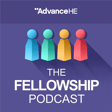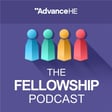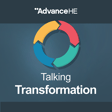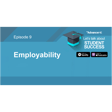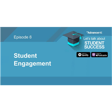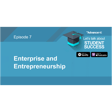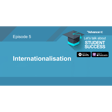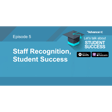Become a Creator today!Start creating today - Share your story with the world!
Start for free
00:00:00
00:00:01

Associate Fellowship/Descriptor 1
In this episode Louise and the team discuss Associate Fellowship, which aligns to Descriptor 1 of the Professional Standards Framework. This category can be applicable to a wide range of job roles and experience, including student teachers and professional service staff, as long as, as with the other categories, you can demonstrate the impact of your teaching.
They touch on who the category is suitable for, what a successful application looks like and top tips for those thinking of applying.
Transcript
Introduction and Previous Episode Recap
00:00:12
Speaker
Hello and welcome to episode six of our Fellowship podcast series. So it's hello from me, Louise Lumsden, Head of Fellowships Teaching, and I'm delighted to be joined again by Raj.
00:00:25
Speaker
Hello, Raj Deema here, Fellowship and Awards Advisor at Advance HE. And Marita. Hello, Marita Grimwood here, Senior Advisor for Teaching Fellowships at Advance HE.
00:00:36
Speaker
Hello, Raj and Marita. So as a reminder, you can get involved with our Fellowship podcast series via the hashtag AHE Fellowship Pod. and Please do. We'd really love to hear from you.
00:00:49
Speaker
um In our last episode, we focused on Fellowship, which is Descriptor 2 of the Professional Standards Framework for Teaching and Supporting Learning. That particular category is the largest, has the largest number of Fellows and is suitable for those who can demonstrate depth and breadth within a range of teaching and supporting learning practice and responsibilities.
00:01:13
Speaker
And we hope that um you enjoyed listening to that particular episode.
Focus on Descriptor 1 and its Importance
00:01:18
Speaker
For this episode, we're going to focus on Descriptor 1. And Descriptor 1 aligns with Advanced HE recognition as Associate Fellow.
00:01:29
Speaker
Now, many Associate Fellows are awarded through accredited institutional programmes and schemes. And that might be through a formal accredited programme, such as part of a postgraduate certificate, or it could be through a a formal dedicated course for those who are undertaking some teaching and support supporting learning responsibilities.
00:01:52
Speaker
And similarly, applicants may apply through their accredited institutional CPD schemes. For direct application, Raj and Marita, where shall we
Criteria and Requirements for Descriptor 1
00:02:04
Speaker
start?
00:02:04
Speaker
And I think perhaps a good thing to start is, Raj, will you explain the descriptor one criteria and the requirements? And that will set us off brilliantly. Yeah, very happy to do so, Louise, and thank you for inviting us to to focus on a session on Descriptor 1 and Associate Fellow, which I'm pleased we're we're doing for our listeners.
00:02:26
Speaker
ah Along with Descriptor 2, this is ah category that's the longest standing category that exists as part of the Professional Standards Framework. um It was around in the 2006 version with iterations in 2011 and most recently in 2023.
00:02:45
Speaker
in twenty twenty three So the establishment of this particular category for those that are involved in teaching or supporting learning at this category has been around for quite some time.
00:02:57
Speaker
Now, and in the most recent iteration of PSF 2023, Descriptor 1 is depicted and described as being suitable for individuals whose practice enables them to evidence some dimensions.
00:03:10
Speaker
Evidence of practice in teaching and supportive learning is demonstrated through evidence of three criteria. So we've got D11, that's use of appropriate professional values, including at least V1 and V3.
00:03:24
Speaker
D1.2, application of appropriate core knowledge, including at least K1, K2, and K3, and d one three That's effective and inclusive practice in at least two of the five areas of activity.
00:03:38
Speaker
So what we can see here is that encapsulated within the requirements of the criteria are very specific dimensions namely V1 and V3, and K1, K2, and K3 within the selected children areas of activity that individual applicants might consider to to work on. So that's the remit that we're working with to set us off in relation to the criteria, I'd say.
00:04:03
Speaker
Thank you, Raj.
Eligibility and Broad Definition of Teaching Roles
00:04:04
Speaker
And I think, is it worth um saying, Marita, who might apply before we start talking about the nuts and bolts of the application requirements?
00:04:14
Speaker
Yes, I think that's a very useful thing to do. So because you don't need to evidence depth and breadth of practice, and because you don't need to evidence all the dimensions of the framework,
00:04:29
Speaker
It's very, very open to a lot of different people. So, for example, postgraduates who teach or demonstrate or who supervise informally.
00:04:41
Speaker
um Those who are very early career in teaching and learning and don't yet have the breadth and depth of practice, but will do in future. Professional services staff. So for example, people who work um in that the library or technicians who work in a supporting role with learning and teaching, careers, educators, research skills developers, et cetera, who work with um research students.
00:05:11
Speaker
And if you if were to think about slightly different categories of people, professional or creative practitioners who contribute some teaching or supervision in a university context alongside their professional practice that they do the rest of the rest but the rest of their time. So people working part time perhaps, clinicians also who might do a small amount of teaching.
00:05:38
Speaker
um I'd just like to highlight two more things about who it's who it's for as well. So I have had, i mean, one really interesting group is researchers.
00:05:49
Speaker
And i have met and supported researchers over the years who don't recognise that they're actually doing teaching, but could be recognised at T1. t one um So they might say things like, oh, I only supervise or I only run seminars or tutorial.
00:06:07
Speaker
That is teaching. And that is where a lot of the learning is actually going to happen, um probably more than their professor who's giving the lecture on the on the programme. So absolutely, it's it's the widest definition of teaching and supporting learning and teaching.
00:06:26
Speaker
everything that is supporting student learning will count. The other thing to say is that it's not role specific. So if you have had a career in research and maybe research leadership,
00:06:41
Speaker
But the only teaching you really do is supervising a few PhD students. It could be that D1 is the right category for you, because if your leadership isn't in learning and teaching, if you're not programme leader, you've not got that significant breadth and depth, this could be right for
Descriptor 1 Recognition and Its Widespread Impact
00:07:01
Speaker
you. So it's a lovely...
00:07:03
Speaker
example I think this category of why um why they are categories of fellowship and not levels because it's not about the grade at which you're employed.
00:07:15
Speaker
I think that's a really excellent point Marita it's about the experience and as you were speaking you know thinking about technicians and the role of the technician you know I used to have the support of a technician it's invaluable to the support that student learning and the experience and I was reminded of the description of the descriptor one criteria. So it's a D1 is suitable for individuals whose practice enables them to evidence some dimensions, as Raj has explained, effectiveness of practice in teaching and or support of learning. And it's just that really important, that inclusive nature of the professional standards framework about teaching and or supportive learning. Yes.
00:07:56
Speaker
And to just to build very briefly on that, I think it because it only requires you to evidence two areas of activity, it's not about if you don't assess That's not a barrier.
00:08:10
Speaker
If you don't actually design and plan learning activities because you are supporting students via drop in sessions, for example, that's not necessarily a barrier.
00:08:20
Speaker
So if you think you have some involvement with student learning, please have a look and see if it might be for you. Yeah, I mean, I think hearing both of you speak is is really signaling to me just the significance of this category in in its own right.
00:08:39
Speaker
There were 48,000 people recognized that this category is a huge number of people. And what that does is reflect a myriad of ways in which student learning is supported and how teaching actually operates in practice.
00:08:53
Speaker
And I think now more than ever, that is more diverse than I've ever seen it to be with ah different responsibilities, different experience, different people coming in and out of higher education, of tertiary education, and also where that teaching is taking place, where that supportive learning is taking place.
00:09:09
Speaker
not just within the realms of a HE set of offices or buildings, etc., etc., but in all sorts of different contexts, work-based learning, work-integrated learning, in industry, in discipline context and subject context, and that support for learning can make a transformative difference and does make a transformative difference to the learning experience of those learners directly involved in that support and things like pastoral support support progress and the huge drivers for change around belonging and retention for example are really a critical aspect of this where associate fellowship and the the nature of the work associated with it
00:09:48
Speaker
really contributes to this particular category. So we're pleased that where we're focusing on this and to to share this with our listeners. Yeah, that definitely. It is a really important and and I think it's a really exciting and buzzy category because you've got such a myriad of experience that could be presented um within a
Pathways and Evidence for Recognition
00:10:07
Speaker
claim. And on that note, I wondered, Raj, if we could start to unpick a little bit the requirements of an application, certainly coming into direct application to Advance HE and how applicants might start to consider the evidence and which are might be the most suitable areas of activity for them.
00:10:28
Speaker
Yeah, so I think i'll I'll couch this in two ways, remembering that ah any category of fellowship, there there are two ways in which professional recognition can be sought and achieved. So the first and primary way is by an institutional advanced HG accredited program or scheme or equivalent and that's the main way in in which the majority of Associate Fellows will achieve this particular category.
00:10:51
Speaker
And so therefore, in an institution would set out those parameters for the design, the teaching, the assessment of those programmes, which may be multifaceted. So there may be several assessments that contribute towards the award of Associate Fellowship that builds both the development of practice in higher education, teaching supporting learning, as well as the formal recognition of that in whatever summative assessment is designed by an institution.
00:11:17
Speaker
And that could be a whole range of things because it includes things like observations, it can include written assessments, it could be verbal assessments, etc. At an institution, an individual will experience that in in their own right, in their context. So I want to say that first.
00:11:32
Speaker
The other option for those people that don't have access to an institution accredited pathway D1 for associate fellows via direct application. So I'll say little bit about that. and a direct application for DE1 for Associate Fellow is a 300 word context statement followed by 1400 word reflective counter practice split across two chosen areas that the applicant decides to focus on and each area activity will be approximately 700 words to integrate and incorporate the evidence for v one and V2 and then K1, K2 and K3 as appropriate to the examples of practice provided by the um applicant.
00:12:14
Speaker
and They also have space to provide a couple of hundred words for reference list and a reference list through which the citations will be built into the application itself. And the application is also endorsed and verified by one supporting statement from someone suitable to provide that type of verification.
00:12:34
Speaker
So that's the entirety of the evidence base. So it's not a huge amount and applicants need to think carefully. And even if they their remit is is small or limited or specific, they still need to be mindful about which examples they choose, particularly if they have you know lots of fractional contracts or a mixture of different responsibilities.
00:12:53
Speaker
given the space that we they have. And as part of that, their choice of examples should choose the most relevant areas of activity. so as Mirita has touched on, if you're not assessing or giving feedback, then you wouldn't choose A3.
00:13:06
Speaker
But if you are teaching in some shape or form, and there's a whole range of different types of example of what teaching means, of what support supporting learning means in the guide to the dimensions for associate fellow, and that includes things like supervision, support, tutorials, et cetera.
00:13:22
Speaker
Those are the things to focus on, and particularly thinking about how an applicant knows that they're carrying out that work meaningfully, effectively, and inclusively. I think linked to that as well is is about not only the choice of ah of examples but the range of examples included.
00:13:40
Speaker
So while an applicant is not demonstrating all dimensions at at a breadth and depth that's needed for D2, they need to show that effectiveness beyond the single iteration a experience it can't just be based on one workshop or one seminar one delivery of something there needs to be a way in which there's ongoing involvement in that work supported by some kind of critical evaluation linked to k3 in order to make improvements to practice and carry that out so an example would i would use is someone and perhaps that's engaged in pastoral work or personal tutor work, and they may have a select group of students that they're working with on a particular course or programme or service, and they've engaged with those students through maybe a couple of terms or a few semesters.
00:14:27
Speaker
and have solicited feedback from those learners to find gaps or areas of development that would be worthy of making better. and And they've acted upon that to change their approach, for example, to maybe with a stronger understanding of who their learners are, because that may have not been as clear in the first ah delivery of of that support.
00:14:47
Speaker
And then they've modified practice. to to support further ah students and seeing better outcomes and progression and and results for not only their own practice, but for their learners themselves.
00:14:58
Speaker
So an applicant needs to choose work that enables them to show that and in a way that enables to put in the evidence as well to the criteria. so Thank you, Rad. Yes, I think um it's the choice, it's the selection of the um evidence, isn't it?
00:15:16
Speaker
And that also links to the evidence base that v3 professional value v3 which is a requirement you know the rationale for why you're choosing the approaches that you choose to take and marita's nodding so i don't know do you want to come in about evidence and uh what makes good evidence within an application uh thanks louise so i think it's really so for v3
00:15:44
Speaker
um It's very much about showing that you are drawing on evidence-informed practice. And ah that can sound quite daunting if you're replying for D1, think.
00:15:59
Speaker
But it's more about the rigour and use of how you use your evidence rather than knowing huge amount that you are bringing to your teaching.
00:16:13
Speaker
so For example, um you might have done some initial development in learning and teaching. You might have attended some workshops which give you an evidence-based for informing what you're doing with students, um or you might have learning from peer observation, either you're being observed or observing other colleagues, which perhaps, you know, from from which you you you can see student engagement strategiests that work
00:16:47
Speaker
or you get feedback on something that you're doing you're not or you weren't maybe weren't aware of that you could change and improve student learning it could be that you've um you've looked at particular article you've you've done a web search zoomed in on the zoomed in on particular article that that's helpful to you but it doesn't need It doesn't need to be a huge amount at this D1. I mean, and it can be as simple as getting that feedback from your students and making changes.
00:17:23
Speaker
Exactly, Marita. And when you when you look at V3, that particular dimensions, use scholarship or research or professional learning. or other evidence-informed approaches as a basis for effective practice.
00:17:36
Speaker
So there's a range there of how you can demonstrate your evidence-informed approaches as part of your claim within the particular area of activity that you're writing about, can't you?
00:17:48
Speaker
And Raj also mentioned the guide too. So as always, we would always, first port of call would be the fellowship category tool to make sure that this is absolutely the right category for you.
Guidance for Application Development
00:18:01
Speaker
And then download a pack for Associate Fellow from the Advanced HE website and there you will find the applicant guidance as well as the guide to, as well as and guidance for your referee who's going to write the supporting statement for you.
00:18:19
Speaker
And always have those to hand when you're actually um developing or whether you're supporting um a colleague through that development and construction of of their application.
00:18:31
Speaker
um we've We've spoken in our previous podcasts about reflective writing. um And I think, you know, again, in the Associate Fellow Handbook guidance document, there is links to that as well that then helps to support that structure of writing.
00:18:48
Speaker
And applicants can draw and practice from within the last three. So think, Raj, that aligns to your point about um actually undertaking a particular approach and seeing how it works and critically evaluating it for then how you're going to um undertake that work again in the future. And I don't know if you want to say any more about that. Well, ultimately, you know, all categories are demonstrating whether an individual applicant is showing effective and inclusive practice. So that effectiveness, um which is explained in detail in the guidance, is really about
00:19:27
Speaker
knowing who the learners are, knowing who the students are, and being able to contextualize and adapt that. So no matter how small or big learner groups are, whether that's on a one-to-one basis or very, very small groups, knowing who those learners are, what their needs are, and then adapting. So that might be differentiation for different learners with particular learning challenges.
00:19:46
Speaker
It could be working with learners at different levels, for example. But it's about understanding that nothing's ever fixed in time. so that the teaching or or learning support practice that was done a couple of years ago would then evolve you know in future cohorts and future kind of service iterations of support to enable the individual to learn from that. And that's where the strongest examples tend to come from.
00:20:12
Speaker
whereby it's not just a regurgitation of a responsibility or a role or a remit. I do this, do that, I do the other. It's more around, okay, who am I so as a higher education professional?
00:20:25
Speaker
What context am I operating with? and what responsibility and and accountability do i have within the parameters of my responsibilities to support these learners as best as i can and to enable them to progress or achieve and it's those measures of understanding how that progress has happened and how they know now this could arguably be more challenging for some associate fellows to know about particularly if they don't have access to large organizational institutional data sets but remember that there are peers and colleagues that you're likely to be working with supervisors for example or more senior managers or equally it could be peers but actually through that and through the navigation of your own assessments of how your learners are doing either in sessions live or during or afterwards those are the ways that you can kind of pick up areas of practice that can demonstrate that inclusive practice and that effectiveness of what you're doing as well and also so as well just being kind of mindful here around
00:21:25
Speaker
um making sure that the evidence for that success is as clear as it can be, you know, and there's a range of ways to show that, particularly frigs if I use Weave 1 as an example around diversity, um because this is a requirement at D1 and respecting the individual learners and the effectiveness of that.
00:21:44
Speaker
So if you are modifying something or changing practice to support learners' needs, say what the difference was that it made and why and how you know, and that just allows you to provide real clarity for yourself and for the assessors at some point to know that what you're doing is actually supporting that learner progress to demonstrate the requirements of d1 for associate fellowship thank you raj and i think in your context that's really key isn't it marita thinking about in your context because we've got the wonderful guide to the psf um 2023 dimensions for associate fellowship and we've got all those questions
00:22:21
Speaker
after each dimension to really, you know, ask yourself those questions about how you know what's working, why you're doing a certain thing. And I think, you know, at those moments of inspiration, those documents just are so handy, aren't they, and valuable?
00:22:36
Speaker
i i think they're particularly valuable for this category, Louise, although they're valuable in a particular way because, the The dimensions of the framework cover obviously all four categories and it can be a bit intimidating to look at them and think, oh my goodness, do I have to evidence this? yeah What the dimensions document does very, very well is make very clear what sort of examples might use
00:23:08
Speaker
um what kinds of questions you might ask yourself to reflect on and evidence in the way that you need. And they show thee they show the different kinds of approaches and the different kinds that you can do.
00:23:24
Speaker
different kinds of examples that you could use. You know, it's not ah it's not a tick list, but you need to include all of these examples. It's here, here's what might apply to you. So I would throngly um strongly, strongly advise people to look to look at that, or if you're mentoring someone, to direct them towards that document.
00:23:44
Speaker
Definitely. I think the very relatable because when you look at the specific requirements of the descriptor criteria, it talks about appropriate. So appropriate professional values, appropriate but ah forms of core knowledge.
00:23:57
Speaker
And so i think that's really key because when you look at those examples, you might think, oh, actually, I do do that. And so I do think that there those examples are really relatable and it's always about in your context.
00:24:10
Speaker
you know, and we're all unique and we all have unique, different practice and experience to draw on. um Thinking about the importance of the supporting statement. So direct to Advance HE, there's only a requirement for one supporting statement. I don't know if you' um either of you have got anything, any tips for anybody that might be applying and needs to think about um who might be um a referee for their application.
00:24:39
Speaker
So the referee needs to be able to validate, endorse your the experience you're writing about. They need to be able to to give their perspective on it.
00:24:52
Speaker
um So think very carefully. So there might be there might be members of staff, there might be colleagues at your ah in your context, at your institution that you have a lot of contact with, but actually they might only one of them might be in the position to write you that statement. So think very carefully about who knows your teaching and who can comment on it.
00:25:20
Speaker
Yeah, thank you, Marita,
Supporting Statement and Final Tips
00:25:22
Speaker
definitely. And provide them with your application, the guidance, give them all the tools to be able to undertake because it's a, you know, it's it's a ah responsibility.
00:25:36
Speaker
that's going to really support the application, isn't it? I mean, I think I'd add to that as well. just mean ah Guidance is clear in terms of the what what the referee's role is and what they're doing, but occasionally there can be misunderstandings about what the role of the referee is.
00:25:51
Speaker
um And in some instances, it's about suggesting how competent an applicant is in their research, for example, or their their role as a mentor and kind of commenting on that aspect. So,
00:26:03
Speaker
In terms of nuances, the role of referee for associate fellowship is about the endorsement and verification linked to teaching and learning support. And the the kind of clearest way of doing that is to align um the commentary based on obviously direct knowledge of the applicant's work in teaching, supporting learning,
00:26:22
Speaker
you've also got a structure within the format of an application and also the criteria to work with as well. So although you know you're not formally required as a referee to to use that as a basis, but actually then you can't really go wrong but by using the framework and the criteria and the structure of an application in order to to guide that.
00:26:39
Speaker
And that's just to avoid misunderstandings really about the role of the free. So you know we're not looking for, for example, a job application reference statement or a character reference statement, for example, which wouldn't meet the requirements of verification and endorsement of D1 practice for an applicant. And we just would want to avoid that and that should hopefully be clear for all those involved.
00:27:01
Speaker
Yeah, to endorse and verify, I think those that's the wording, isn't it, of of the application, what the applicant's written to make their claim for this category. I don't know if either of you have got any top tips, any final thoughts about associate fellow.
00:27:17
Speaker
so I think we've explained the nature and characteristic of this category. We've talked about the application requirements, what the evidence might look like.
00:27:28
Speaker
um I don't know if you've got any final um hints or tips that we could provide to anybody who's writing their application at the moment or supporting an applicant. Yeah, I'll start off on this one. I think, you know, this is a category that's really well used in the sector, particularly in accredited provision. I've just got some numbers here in terms of what that looks like. There was over 5000 recognised in 2022, 2023, 2023 through accredited provision and success rates are pretty good as well hovering around the 78% mark at this particular category. So generally, it's worked well and understood and demonstrated.
00:28:05
Speaker
But in terms of kind of tips, I just think this one as well is that there may be lots of work happening to support and develop practice. So, for example, the creation of lesson plans or observation plans or documentation around observation and just being mindful that those types of things, certainly in a direct application, are not needed. You know, you don't need to include an observation or a lesson plan in your application in and of itself, although you might do that separately as part of development or you might be required to do that for an accredited pathway that requires you to submit that.
00:28:36
Speaker
but not for a direct application. So there are some nuances and differences to think about the the role and purpose of the evidence that you're creating and and the format of a final submission in whatever that needs to be. um And I just wanted to kind of bring out a quote really ah that I found recently from an associate fellow where they'd recently achieved associate fellowship and was through direct application.
00:28:58
Speaker
And they shared this through a blog and the title was it was a boost for their teaching career. So they said, this makes me feel in relation to associate fellowship, part of a community of educators, researchers and teaching professionals with similar values and
Benefits of Recognition and Personal Impact
00:29:13
Speaker
experiences.
00:29:13
Speaker
In turn, it makes me feel more enthusiastic about my work and confident about my own teaching experience. And I just think that really encapsulates well what associate fellowship is, that they're they're on a typically on a journey or they're kind of at a point in time.
00:29:27
Speaker
And that's what's been recognised at this particular category and absolutely celebrated, you know, through our continuation of the festival, for example, this year. So I think, yeah, I kind of hang some of my kind of closing points on that.
00:29:39
Speaker
Yeah, no, thank you for sharing that. And Marita, we see some really nice examples, don't we, of blogs and what it actually means to applicants who' have been successful and been awarded.
00:29:51
Speaker
We absolutely do. And I'll just like as a final comment, come back, almost circle back to where we started about how important this category is.
00:30:02
Speaker
um If you're working directly with students, you're maybe working one to one with them, you're supporting very closely in their learning, maybe as a ah lab demonstrator, maybe maybe running a seminar, you're do you're you know you're really at the heart of their learning and you're having a real impact.
00:30:21
Speaker
um So yeah, so i'd like to I'd like to run that into a final hint or tip if I may, which is that it can be very easy. I sometimes see D1 applications where people have got a bit distracted from their own practice and start writing more about the module or the program or the general context in which they're working it's got to be a personal account of practice and if your practice is working one-to-one with students then that's what you need to write about so we need to understand a bit about the context but we need your reflection on where you've got the responsibility if you're demonstrating it's how do you
00:31:04
Speaker
how do you manage those interactions with students? How do you how do you encourage them to ask questions when they need to? And how do you respond in a way that encourages them to learn?
00:31:16
Speaker
So um getting that focus on on where on where you are on those areas of teaching and supporting learning for which you are responsible. ah Definitely. I think that's really wise advice. um And it's also once you've set out your approaches and what you do and how and why you do it. Don't stop there. Tell us what happened.
00:31:39
Speaker
What happened as a result? How did you know it worked? And that sort of completes that circle, doesn't it? And what you might do differently next time. oh As always, Raj and Marita, you've had some, um you've provided us with some really insightful suggestions and hints and tips. And I think we've really explored Associate Fellow and the value of this category I think has really come to light. So thank you so much for sharing your and highlights and expertise and knowledge of Associate Fellowship.
00:32:11
Speaker
um There's some really helpful hints and tips for but for either applicants or those supporting to take away from from this as episode.
00:32:23
Speaker
um How an applicant structures their application, as we've touched on, will be very personal. And we've discussed in previous episodes that simple reflective model. So we would always highlight the guidance and we've've we've um highlighted that today.
00:32:38
Speaker
And just having a look and always having that close to hand, I think that's really important. So if you are considering an application or in if you're in the process of developing an application, please do download and keep referring to the applicant guidance and the guide to the PSF 2023 dimensions.
00:32:58
Speaker
for Associate Fellowship, as we've discussed. And that will help and support you through the process and help you to gather the ideas and think about your practice and thinking about your strongest examples to include in your application.
00:33:13
Speaker
And as Raj mentioned, please also check the fellowship blogs on the Advance HE website. um They are an excellent way to hear from others about how they went about their application, perhaps how they structured it, what it actually, what the process felt like and what it actually means to them um to be awarded.
Episode Conclusion and Call to Action
00:33:32
Speaker
And a final reminder, please don't forget to get involved with our year-long Festival of Fellows via the hashtag Festival of Fellowship. um We've got some really nice um testimonials on there, some nice phrases, some video content.
00:33:48
Speaker
And again, that's demonstrating the impact of fellowship that we'll be exploring um in our next episode. So all remains for me to say is thank you for listening.
00:33:58
Speaker
And once again, thank you to Raj and Marita. And we'll see you again soon. Thank you. Bye. Bye.
